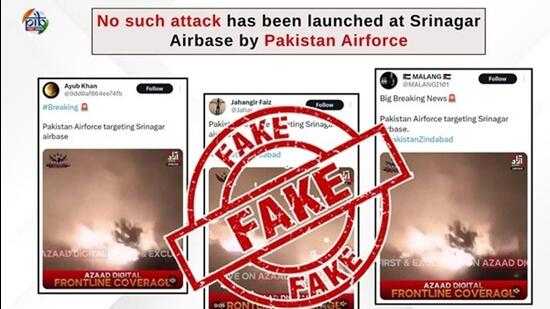As Operation Sindoor unfolds with high-stakes military maneuvers by Indian armed forces targeting terror infrastructure across Pakistan and Pakistan-occupied Kashmir (PoK), another battle is playing out online—one driven by misinformation, doctored images, and misleading narratives. To counter this parallel war of perception, the Indian government’s Fact Check Unit (FCU), operating under the Press Information Bureau (PIB), has significantly ramped up its efforts to debunk fake news and misinformation being widely circulated on social media platforms such as X (formerly Twitter), Facebook, and WhatsApp.
18 Misinformation Claims Busted in 24 Hours
Since the early hours of May 7, just after India officially launched Operation Sindoor, the FCU has been working around the clock. According to officials familiar with the matter, the unit has witnessed a sharp surge in queries seeking verification of viral posts. “The unit has seen a marked spike in queries since the early hours of May 7, shortly after India launched Operation Sindoor, with a significant uptick in requests for verification pouring in from 3 am onwards,” a PIB official revealed on the condition of anonymity.
Within just 24 hours, the unit had already issued at least 18 rebuttals addressing various false narratives that emerged following the April 22 terror attack in Pahalgam, Jammu and Kashmir, where 26 people lost their lives. These clarifications were disseminated through the FCU’s official handles on social media, which have become a critical tool for combating the wave of online misinformation.
Fake IAF Jet Image Debunked
One of the most prominent fake narratives that gained traction was an image purportedly showing an Indian Air Force (IAF) fighter jet allegedly shot down during Operation Sindoor. The photo was widely shared by pro-Pakistan accounts, attempting to suggest Indian casualties in the ongoing military offensive. The FCU quickly flagged the image, clarifying that it was not recent, nor was it connected to the current conflict.
In its rebuttal, the FCU pointed out that the image was actually from September 2024, showing a MiG-29 fighter jet crash in Rajasthan’s Barmer district—an incident that had no relation whatsoever to the present operations. “This is a deliberate attempt to mislead and create confusion among the public,” the FCU noted in its post on X.
Bogus Claims About Army Headquarters and Emergency Advisory
Another widely circulated piece of disinformation falsely claimed that Pakistan had destroyed an Indian Army brigade headquarters. The FCU swiftly labelled this assertion as “completely fake”, urging citizens not to fall prey to unverified social media posts designed to incite panic and spread confusion.
Perhaps even more alarming was a fake emergency advisory that began circulating across messaging platforms like WhatsApp and Telegram. The advisory falsely claimed that the government had instructed citizens to prepare for an emergency by:
- Stocking up on essential groceries and medicines for at least two months
- Keeping ₹50,000 in cash on hand
- Ensuring vehicles were fully fuelled
- Making other “preparations” indicative of a wartime situation
The FCU called out this advisory as a malicious attempt to trigger fear and hoarding behavior. No such advisory has been issued by any official source. “Citizens are advised to ignore such messages and refrain from forwarding them,” the unit stated, emphasizing the need to rely only on verified government sources for updates.
24×7 Vigil to Counter Disinformation
Officials working within the FCU described the last 24 hours as intense, with a massive surge in disinformation requiring immediate attention. “We are active. We are working 24 hours. Our team hasn’t slept since yesterday. We are trying to tackle each and every fake news item coming our way,” one of the FCU team members said.
Social media has become both a tool and a battlefield. While it helps disseminate important updates, it also serves as a breeding ground for misinformation, especially during times of national security tensions. The government’s fact-checking mechanisms are now proving vital to maintain public trust and ensure a well-informed citizenry.
Public Urged to Be Vigilant
As the digital information war intensifies in the backdrop of Operation Sindoor, the FCU has reiterated its appeal to citizens to act responsibly online. “Don’t believe everything you see or read on social media,” the unit cautioned. “Before sharing any post, image, or video, always check the source. When in doubt, report it to our handle @PIBFactCheck for verification.”
In addition, the FCU has encouraged users to bookmark or follow official communication channels, including government websites, verified ministry accounts, and trusted news portals. The unit continues to post real-time updates and debunked content to keep the public informed.
Conclusion
In a time when the line between fact and fiction can be blurred in the blink of an eye, especially during sensitive geopolitical events, the Indian government’s FCU stands at the frontline of a different kind of warfare—one against misinformation. As Operation Sindoor continues to make headlines for its military precision, it is equally important to acknowledge the silent but vital efforts of those countering the onslaught of fake news, which, if left unchecked, could erode public confidence and national morale.
For accurate and timely information, citizens are advised to rely solely on official government channels and avoid sharing unverified posts.
